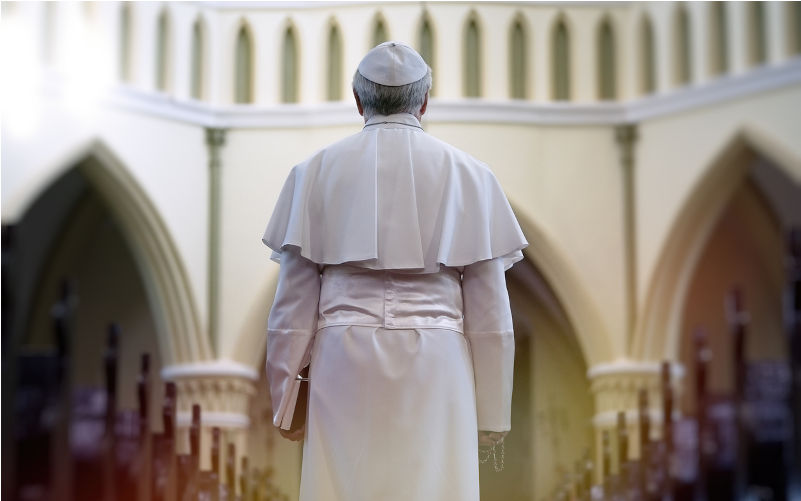Pope fires warning shot to Church leaders who would defy Vatican II
April 21, 2024
The neo-traditionalists have been sent a clear message by Pope Francis that their dismissal of synodality, and their disruptive behaviour do violence to the very nature of the Church itself and thereby damage the Reign of God.
For Pope Francis, synodality is ‘one of the most precious legacies of the Second Vatican Council’ and the most authentic way for the People of God to receive and implement what Vatican II envisioned.
In October 2015, when Francis told the synodal assembly that ‘synodality, as a constitutive element of the Church, offers the most appropriate interpretive framework for the self-understanding of the Church itself, he called on all Catholics to embrace a synodal way of thinking and acting as the path ‘which God expects of the Church of the third millennium’.
Since then, Francis has expanded the composition of the Synod of Bishops to include 70 ‘non-ordained’ members with full voting rights to ensure that the true nature of the Universal Church is properly represented: ‘not some of the bishops some of the time but all of the Church all of the time’.
Synodality: looking to the future
At the 2013/14 Synod on the Family Francis became aware that there was significant deep-seated resistance from some quarters of the Church to the direction he wanted to take it, especially from some bishops. Following that Synod he decided that some coaching in synodality was required and in October 2021 announced a special Synod on Synodality with two General Session to be held over two years, from 2023 to 2024.
During the First Session in October 2023 Francis offered all the members – ordained and non-ordained - a Master Class in the learn-by-doing method. They were introduced to the discipline and asceticism of listening, discerning, and praying together, while communicating on a level playing field and beyond personal agendas. Francis used the 2-session and round-table format trialled at the 5th Australian Plenary Council just a year earlier.
For Francis, the challenge of synodality is ‘to restore and deepen our roots as the People of God journeying together in a common mission as followers of the Way, Jesus Christ’.
Episcopal resistance
One of the most outspoken critics of the Synod was the now deceased Australian Cardinal George Pell, former Archbishop of Sydney and Secretary for the Economy at the Vatican. During Lent 2022, under the pseudonym Demos, Pell published an opinion piece in Settimo Cielo titled ‘A Memorandum on the Next Conclave Is Circulating Among the Cardinals’ in which he denounced the Synod on Synodality with several bombastic and ambit assertions and in January 2023 followed up with another article in The Spectator where he repeated his scathing attacks on the Synod labelling it ‘a toxic nightmare’ and denouncing the Instrumentum Laboris as ‘one of the most incoherent documents ever sent out from Rome,’… ‘couched in neo-Marxist jargon’….’hostile to the Apostolic Tradition’ and ‘contrary to basic Christian tenets such as the four last things’.
Not so outspoken but no less critical of the Synod on Synodality has been Pell’s successor as Archbishop of Sydney, Anthony Fisher OP. Both have frequently bandied expressions such as ‘Apostolic Tradition’ and ‘Deposit of Faith’, ‘settled doctrine’, and ‘what Christ says in the Apostolic Tradition’. Neither, however, ever explained clearly what they mean by these terms, but the implication is that what they are talking about equates with core ‘doctrines’ of which there are few.
Fisher is also cynical, claiming that an (unnamed) eminent theologian remarked to him that ‘of the many synods I have attended, this one was the humanly best but the theologically thinnest’.
But this is precisely what Francis intended it to be: doctrine ‘thin’ but process intensive. What Francis was hoping for is that bishops, like Fisher, would return home with the synodal experience they had lived and model it in their own dioceses.
The notion of tradition
Australian historical theologian, Professor Orm Rush, made one of the few interventions at the Synod. It was profound and a game changer. He identified his primary audience from the start: ‘I have had the impression that some of you are struggling with the notion of tradition, in the light of your love of truth. You are not the first to struggle with this’.
He then went on to cite Cardinal Joseph Ratzinger (later Pope Benedict XVI) on the conflicting notions of tradition in Vatican II and pointed out that the tensions continue to the present:
He (Ratzinger) calls the two co-existent theologies embedded in key Vatican II documents ‘a “static” understanding of tradition and a “dynamic” understanding. The former is legalistic, propositional, and ahistorical (i.e., relevant for all times and places); the latter is personalist, sacramental and rooted in history, and therefore to be interpreted with an historical consciousness. The former tends to focus on the past, the latter on seeing the past being realised in the present, and yet open to a future yet to be revealed.’
In the Catholic tradition, there are very few doctrines which have been formally revealed and most is theological commentary on a tiny core: ’When we study history, we realise that there is very, very little about the church that cannot change.’
Neo-traditionalists and backwardness
Masssimo Faggioli has described those most hostile to Francis as ‘neo-traditionalists’: they are not evangelising the Church but ‘ideologising’ it.
‘Today, it’s the ability to project a dumbed-down, oversimplified, and stereotypically bigoted version of Catholic tradition—stripped of its intellectual complexity and spiritual richness—that gets rewarded: Catholicism as a meme’.
During a September 2021 visit to Bratislava, Slovakia, Francis warned a group of fellow Jesuits that a particular temptation for the Church today is to submit to ‘the ideology of going backward, … an ideology that colonises minds, … a form of ideological colonisation’.
Francis’ recent disciplinary action against deviant bishops must signal a warning to any Church leaders who would defy Vatican II and thereby endanger the unity of the Church. They have been reminded that the bond of unity must be maintained through communion with the Pope and that this pope is prepared to demand a firm commitment to that communion.
The neo-traditionalists have been sent a clear message that their dismissal of synodality, and their disruptive behaviour do violence to the very nature of the Church itself and thereby damage the Reign of God.

